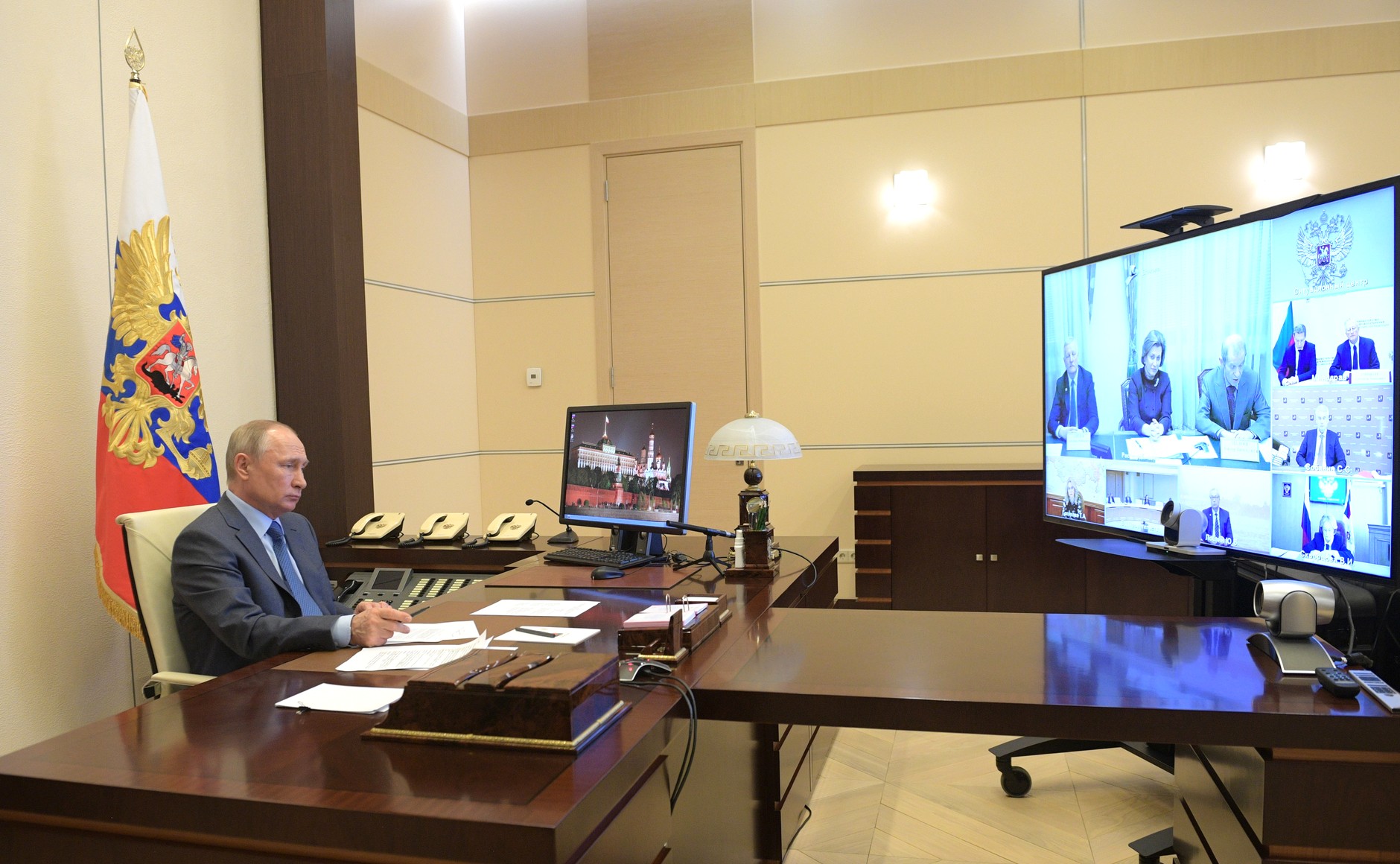 Image source: President of Russia
Image source: President of Russia
A Man of Inaction – Putin’s Domestic Coronavirus Response
Even with news of newly elected Russian Prime Minister Mikhail Mishustin’s COVID-19 diagnosis, the Kremlin is playing a quiet role in curbing the virus. President Putin has made weekly addresses to the nation, but the reality is that coronavirus management has been pushed onto regional governors in Russia. Putin’s biggest perceived threat in the face of the coronavirus is losing political power. Rather than focusing his efforts on domestic relief, Putin has chosen to stand to the side under the pressure of the world’s biggest threat during his twenty-year reign. The danger Putin is overlooking is the virus’ threat to his government’s legitimacy.
Domestic Policies
The Kremlin’s domestic policies to deal with the novel coronavirus have been underwhelming. On March 14th, President Putin created a coronavirus coordination council – initially led by the Prime Minister who has now been replaced by the first deputy prime minister. Putin also created a duplicate structure within the State Council led by Moscow’s Mayor, Sergei Sobyanin. In an April 28th address to the nation, President Putin stated that regional governors have a week from May 5th to plan “independent decisions” on how to proceed after relaxation of restriction regimes. Although the State Council has made recommendations, Putin has stated that regional governors “have room for maneuver” to respond in ways that are best for their populace. Considering that Putin has spent his career leading with a top-down approach, it is outside the norm for regional governors and the Mayor of Moscow to take leading roles in devising and implementing policy.
Regional responses to the pandemic have been disjointed. As a result, measures to assist businesses and people, and the quality of such services, vary between regions. For example, the Komi Republic, one of the most remote regions of Russia, has the largest outbreak outside of a major city. Conversely, the leader of Chechnya has closed off the region from the rest of Russia to protect its populace.
During the coronavirus outbreak, Putin aims to preserve his main political resource, Russia’s plentiful fiscal reserves. As such, Putin has declined to implement social relief packages like those put in place by the United States and Germany. Putin’s aid thus far only amounts to 2.8% of Russia’s GDP, whereas the U.S. and Germany have spent 11% and 10% percent of their GDP, respectively. The Kremlin is avoiding announcing a state of emergency that would force the government to pay disrupted businesses affected by lockdowns. Russia has suggested increasing unemployment benefits by nearly 50%, but only about 0.45% of the population is officially unemployed and eligible for benefits.
Putin Neglecting Responsibility
President Putin has acknowledged that the situation in Russia’s fight against the pandemic is “still very difficult” and that the “peak of the outbreak is still ahead.” Putin has mainly offered commentary that is “muted in tone, refraining from carrying out calls for full mobilization,” according to Fabrice Deprez, an associate scholar from the Foreign Policy Research Institute. Other experts, such as Gleb O. Pavlovsky, a former Kremlin adviser, have observed that Putin is “afraid” because the political system he spent the two decades building is under extreme threat while the country clumsily responds to COVID-19. Putin’s relative discomfort and lack of competence handling public health matters has led him to contradict Russia’s centralized government system by delegating tasks to governors and other Kremlin officials.
It seems that Putin has prioritized geopolitical power over pandemic preparedness. The Kremlin considers lifting economic sanctions and increasing Russia’s ability to pursue its foreign policy as having priority.
Conclusion
The Kremlin’s tepid response to the coronavirus demonstrates that Putin’s structure of government is not optimized to respond to public health crises. The Kremlin took a similar approach in dealing with the HIV/AIDS crisis by neglecting to call for immediate or strong government intervention to help those affected. According to the Levada Center, Russian people are increasingly interested in domestic issues such as higher wages, pensions, and better access to healthcare. As of 2017, Russians believe that restoring the country’s greatness had already been accomplished and that the government should focus on domestic problems. With Putin’s apparent disinterest in applying his strategic prowess to containing an outbreak with strong executive directives, he is proving that his style of government cannot deliver on the things Russians want most. If local leaders are expected to govern their regions without strong Kremlin decision making, the federal hierarchy Putin has constructed may be delegitimized.





